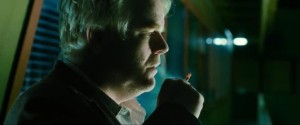 This week I watched Philip Seymour Hoffman in his final completed film. Now there’s a sentence I hated saying. You probably know that Hoffman died about six months ago from a heroin overdose. A recovering addict who was clean for 23 years before his fatal relapse, his death robbed us of one of our finest actors.
This week I watched Philip Seymour Hoffman in his final completed film. Now there’s a sentence I hated saying. You probably know that Hoffman died about six months ago from a heroin overdose. A recovering addict who was clean for 23 years before his fatal relapse, his death robbed us of one of our finest actors.
A Most Wanted Man is more evidence, as if we needed it, of his amazing talent. It’s a spy film, adapted by Andrew Bovell from a novel by John Le Carré, and directed by Anton Corbijn. Hoffman plays Gunther Bachmann, the head of a small, under-the-radar anti-terror unit in Hamburg, formed (we are told) because the chief of the 9/11 hijackers had slipped through there without detection, leaving a stain on the reputation of German intelligence. As the film opens, the unit has discovered the entry into the city of an undocumented Chechen refugee with a troubling past named Issa Karpov, and played by Grigoriy Dobrygin. What is he up to? After some digging around, they find that he is seeking to meet with a high level international banker played by Willem Dafoe. Into the mix is thrown Rachel McAdams as an idealistic lawyer trying to help Issa get legal sanctuary. Meanwhile, the higher-ups in German intelligence are becoming interested too, along with the Americans, in particular an operative played by Robin Wright.
If you’re familiar with the novels of John Le Carré, you’ll know that A Most Wanted Man isn’t about guns or car chases or explosions. His stories are cerebral cat-and-mouse games where you’re never sure who to trust, and where the moral landscape is hazy and filled with traps and pitfalls. Corbijn’s direction is rigorous—towards the end I was actually on the edge of my seat with suspense in a sequence involving nothing more extraordinary than the signing of a document. But the element that pulls the film together is, of course, Hoffman. With his perpetually hunched shoulders, going methodically about his business while chain smoking, Gunther is a man who guards his secrets closely. Hoffman absorbs himself into this character, depicting this bundle of contained fury with a mastery that makes all the macho hero stuff you usually get in suspense films look as phony and contrived as a cartoon. He’s the classic Le Carré spy, too experienced to believe in ideals, but still trying against the odds to work something out in his corner of the world. The movie also plays against the conventional stereotype of the Muslim as terrorist—there’s a grim, rueful humor in the way our illusions get punctured here.
Ultimately the sadness of the main character in A Most Wanted Man was reflected in my own sadness for our loss of the actor playing him. Go to see the film for Philip Seymour Hoffman—you won’t see his like again.

